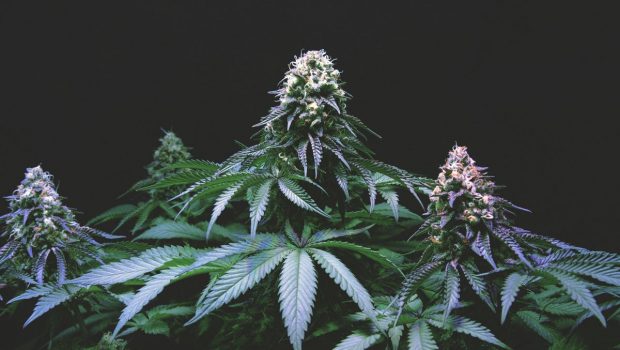New Gene Technology Allows Growers To Boost THC Levels In Cannabis
Indiana-based biotechnology company Growing Together Research Inc. announced this week that it has developed a new technique to genetically modulate the expression of Delta-9-tetrahydrocannabinol (THC) in cannabis, including the ability to increase levels of the cannabinoid in cultivars grown for recreational or medical marijuana.
In August 2020, GTR partnered with Texas A&M Agrilife Research to develop and optimize protocols for genetic transformation of industrial hemp for commercial purposes. Earlier this year, the partnership revealed it had achieved the first known stable transformation and regeneration of multiple THC-free hemp cultivars. The results included validated gene edits that are expected to eliminate or nearly eliminate production of THC and the minor cannabinoid cannabichromene while boosting expression of cannabidiol (CBD). The transformed cultivars are expected to be ready for market in the fourth quarter of 2022 and are intended to help U.S. hemp farmers manage the risk of their crop exceeding federal THC limits, which often requires the grower to destroy the crop or face serious legal repercussions for cultivating marijuana.
Indiana-based Growing Together Research Inc. and Texas A&M Agrilife have developed a technique to ... [+]
According to research by New Frontier Data, more than 10% of planted hemp acreage between 2018 and 2020 went “hot,” exceeding the 0.3% federal limit on THC. Additionally, research on a cross section of currently cultivated varieties of hemp published by Frontiers in Genetics indicates that many cultivars express significantly higher levels of THC than permitted and inconsistent levels of CBD compared to the certificates of analysis presented to growers.
Turning Up The THC
After demonstrating the ability to turn “down” or “off” the genes coding for THC expression, GTR is now using the same technique to turn THC expression “up.” The company plans to launch an effort in collaboration with academic and commercial partners in Canada to create cannabis cultivars with enhanced expression of THC, with an initial set of high-THC varietals expected to be created by the third quarter of 2023.
A cannabis plant grown using GTR's Delta9 Dial.
The scientific ability to modulate THC expression up and down, referred to by GTR as the “Delta9 Dial,” represents a new advancement in stable gene editing of the cannabis plant, which the company says is notoriously difficult to transform. The new technique also further establishes the capabilities of GTR’s genomics platform, where producers may choose from a menu of traits to customize their plants’ genetics and optimize their value.
Samuel E. Proctor, CEO of GTR, says that the Delta9 Dial could eventually be used to modulate THC levels in cannabis to a specific target percentage.
“The same technique we are using to create a silenced THC plant can be used to modulate CBD and CBC levels as well, so while we are currently focused on silenced THC and high THC cultivars, we may be able to “tune” our approach to whatever cannabinoid content our customers and partners are seeking,” Proctor says in an virtual interview.
GTR's genetic technique could eventually allow growers to dial in a targeted THC potency for popular ... [+]
The technique also appears to be effective on most if not all cultivars of cannabis, allowing cultivators to dial up the THC percentage in strains of marijuana already popular with consumers.
“We have started with five different cultivars in the lab and have been able to successfully and stably transform all five cultivars,” Proctor reports. “This success indicates that our technique should be applicable to all cultivars, whether it’s for silencing or increasing levels of THC.”
Are Smokers Ready For GMO Weed?
While the cannabis marketplace has a pronounced tendency to purchase marijuana largely based on THC potency, whether consumers will plunk down their hard-earned cash on genetically modified cannabis remains to be seen.
“Today, GMOs have become a stand-in for the modern Agro-Industrial Complex, which has rightfully attracted a lot of negative press and poisoned the well of public opinion against GMOs,” Dimitri Samaratunga, GTR’s COO, acknowledges.
Are consumers ready for GMO weed?
But he says that common reservations about GMO foods do not apply to GTR’s technique to boost or reduce THC levels in cannabis.
“In general, we think significant concern around GMOs stems from a fear of unnaturally shuffling genes between different organisms/species to create a “Franken-organism” — this is not our approach,” Samaratunga explains. “Instead, GTR is introducing a short DNA sequence that blocks the production of a single enzyme involved in a single branch of the cannabinoid biosynthetic pathway. There are no foreign genes added from other organisms.”
Proctor adds that biotechnology is currently being used to improve diets by boosting nutritional content in foods, while broadening and improving the variety of fruits and vegetables available. He also notes that biotechnology can help the environment by lessening our use of harmful chemical pesticides and herbicides, reducing deforestation by increasing agricultural productivity and increasing a plant’s carbon sequestration capacity.
“These clear benefits are often obscured or not discussed in the context of biotechnology and agriculture,” Proctor says, “but it is important to keep them in mind to properly understand how biotechnology-driven approaches are beneficial.”








Gloss